Iran's acting FM attends UN security council meeting
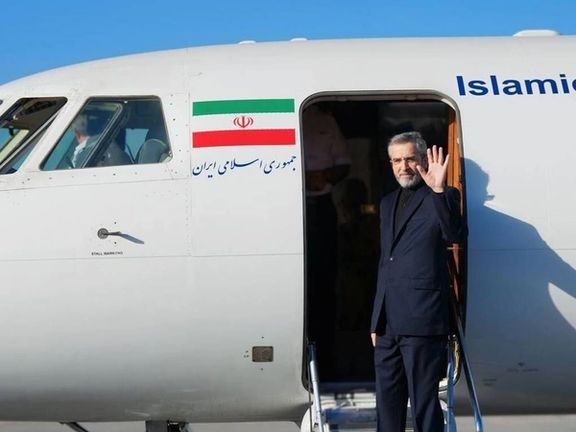
Iran’s Acting Minister of Foreign Affairs led a delegation to New York on Monday to participate in two UN Security Council meetings focusing on the escalating situation in the Middle East.

Iran’s Acting Minister of Foreign Affairs led a delegation to New York on Monday to participate in two UN Security Council meetings focusing on the escalating situation in the Middle East.
The meetings are chaired by Russia’s foreign minister under the rotating presidency of the UN Security Council held by Vassily A. Nebenzia. The sessions aim to discuss the future global security architecture and the United Nations' role in establishing global peace.
However, the participation of Iran in these discussions has led to backlash amid its proxy aggression across the Middle East, nuclear ambitions, and human rights abuses at home.
Iran's proxies in Gaza, Lebanon, Syria, Yemen and Iraq are all currently part of a circle attacking both Israel and US targets in the Middle East amid the war in Gaza. Yemen's Houthis are also currently blockading the Red Sea region, targeting commercial shipping.
The open debate on the Middle East, scheduled for July 17, will feature Tor Wennesland, Special Coordinator for the Middle East Peace Process, and will spotlight the ongoing situation in Palestine.
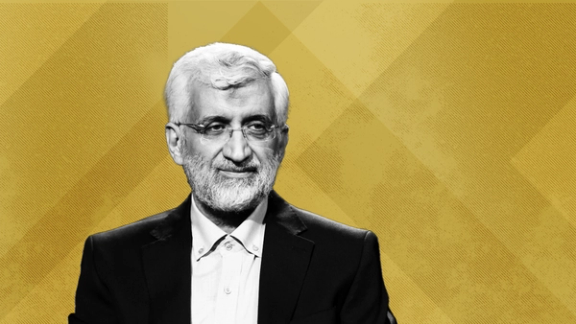
In the aftermath of Masoud Pezeshkian’s victory in the Iranian presidential election, talk of a shadow government by his hardliner rival Saeed Jalili has sparked intense debate.
Critics question the legitimacy and funding of Jalili’s self-styled oversight body, challenging its alignment with the late president Ebrahim Raisi’s administration and highlighting the broader political rift within the country.
What constitutes a shadow government?
A select number of countries, including Canada, Australia, and the United Kingdom, implement the shadow government system. According to the British Parliament, each shadow cabinet member is tasked with leading a specific policy area and challenging their government counterpart. This structure allows the official opposition to position itself as an alternative government-in-waiting.
What, then, would be considered a shadow government in Iran?
In Iran, a shadow government is not a legal or traditional concept.
Jalili uses the term, but his interpretation deviates from the international concept. First, Jalili does not represent an opposition party, as he is not affiliated with any. The Paydari Party endorses him, although he is not a member himself. Second, his interpretation extends beyond the government to encompass the entire state apparatus.
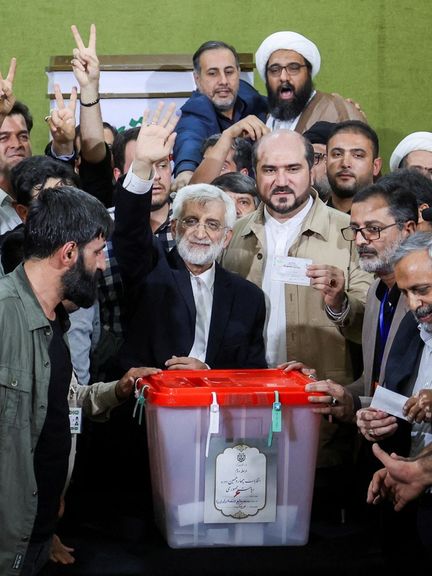
How does Jalili conceptualize a shadow government?
Jalili first broached the concept of forming a shadow government following the establishment of Hassan Rouhani's first administration in 2013.
According to his official website, his shadow government comprises a series of trips, meetings, and working groups aimed at "formulating step-by-step actions on fundamental economic, managerial, political, and cultural issues."
Jalili articulated the notion as “a discourse and a movement,” asserting that “anyone in society who feels a responsibility for the country's trajectory, the revolution, and various issues should meticulously monitor developments to the best of their ability and endeavor to exert a positive influence.”

He also stressed that it is not limited to the executive branch but includes the legislature, and judiciary.
During his presidential campaign in 2024, Jalili revealed the extensive scale of his shadow government, which he described as comprising “over a thousand managers and experts dedicated to meticulously monitoring national issues and formulating innovative solutions.”
He further noted that, under this initiative, he has personally undertaken more than 140 trips to various regions nationwide.
What criticisms are levied against Jalili's shadow government?
Interestingly, Supreme Leader Ali Khamenei was among the first to oppose Jalili's efforts.
“The relevant officials should undertake the work themselves. Parallel work alongside the government apparatus is not successful. This has been my definitive experience over the years,” Khamenei said in 2018.
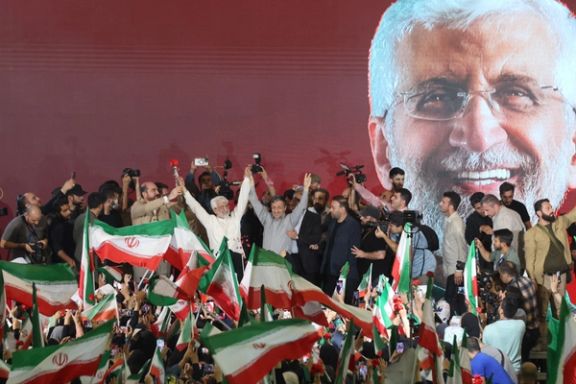
When Jalili initially introduced the concept during Rouhani's tenure, critics asserted that his primary objective was to "obstruct" the nuclear negotiations conducted under Rouhani's administration. A fervent critic of Tehran's 2015 nuclear agreement with major powers, Jalili had previously served as Iran's chief nuclear negotiator from 2007 to 2012. During his tenure, Tehran adopted a defiant and unyielding stance in negotiations with global powers over its uranium enrichment program. This period saw the imposition of three UN Security Council resolutions on Iran, with multiple attempts to resolve the conflict proving unsuccessful.
After Rouhani's tenure ended and hardliner Ebrahim Raisi assumed office, Jalili's shadow government made no significant public statements. However, during the recent presidential elections, as Jalili touted "plans derived from the experience of the shadow government," other candidates began to criticize him.
Among the critics was Mostafa Pourmohammadi, a presidential candidate and former justice minister. He criticized Jalili by asserting that the activities of a shadow government do not constitute genuine action, emphasizing that only those initiatives conducted transparently and openly "in the light" genuinely matter, as opposed to those carried out "in the shadow."
Pezeshkian also emphasized that a clandestine shadow government is unlikely to significantly improve the country's citizens' lives. He also raised concerns regarding the funding for Jalili’s shadow cabinet.
"He should clarify the sources of the funds that enabled these experts to collaborate with him," Pezeshkian stated during a presidential debate for the runoff election. "Additionally, he should disclose the identities of these individuals compensated for their research efforts."
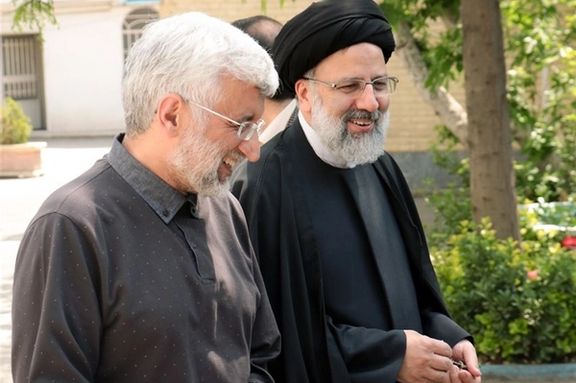
Following Pezeshkian's victory, numerous reformist media outlets and politicians raised concerns about the origins of the funds supporting Jalili's program. After Pezeshkian's election win, tensions escalated when Jalili met with him and expressed a willingness to collaborate with the new administration, provided it adhered to "revolutionary principles." Jalili also sternly warned that any deviations or errors would prompt decisive and forceful intervention on his part.
Mahmoud Vaezi, the former chief of staff to ex-president Rouhani, stated that it is “dangerous” for a failed candidate to claim he wants to form a shadow government.
“The question is, what authority does Jalili have to declare himself an arbiter of governance, saying he will intervene if Pezeshkian does not perform correctly? Many of Jalili's preferred policies face serious criticism from officials who do not endorse his proposed model,” Vaezi said on Saturday.
A reformist political activist, Ali Bagheri, also said that a shadow government requires transparency.
“What is the identity of this entity engaged in critiquing and reviewing the government while offering reform proposals? What is its legal status? From where does it derive its wealth and fund its operations?” Bagheri said on Saturday.
“It is a fundamental principle that anyone or any entity aspiring to position itself as a shadow government must first fully disclose its identity,” he added.
Former MP Esmail Gerami Moghadam remarked that the alignment of Jalili's shadow government with the late President Raisi's administration rendered its formation meaningless, given their shared hardline stance. He elaborated, "Fundamentally, a shadow government is intended for political parties. It is the parties that establish shadow governments." Moghadam observed that Jalili neither possesses nor plans to establish a party, prompting the inquiry, "Who has commissioned him to form a shadow government? Is it financed from his funds?"
One of the major criticisms came from Heshmatollah Falahatpisheh, former head of the Iranian Parliament's Foreign Policy Committee. He remarked, “The only things we have seen from the shadow government so far are obstructions in political and domestic issues, imposing significant costs on the country regarding the International Financial Task Force (FATF).”
The FATF is an international financial watchdog that spearheads efforts to combat money laundering, terrorist financing, and the financing of weapons proliferation. In recent years, Iran has been placed on the financial watchdog’s “blacklist” due to its failure to adhere to transparency standards and international conventions against money laundering and terrorism financing.
Saeed Jalili's resistance to adopting the Financial Action Task Force (FATF) recommendations had emerged as a pivotal topic in the sudden presidential election debates in Iran.
For more than a decade, the debate over FATF compliance, intertwined with the persistent challenge of international sanctions, has dominated Iran's foreign relations discourse.
During the presidential elections, Pourmohammadi disclosed that during a session at the Supreme National Security Council, Jalili admitted they were not adhering to FATF regulations to disrupt Rouhani's government.

Falahatpisheh criticized the shadow government, stating that if its outcome was the forfeiture of the opportunity to revive the JCPOA, entangling Iran in the Ukraine conflict, and placing Iran on the FATF list, then it has not served the nation. "In my view, it has never prioritized the interests of the Iranian people," he remarked. He further noted that forming a shadow government while an official administration is in office is futile and merely reflects the ambitions of certain individuals.
“A shadow government is for parliamentary systems, where a minority party forms a shadow cabinet to oversee the majority government, ready to take over if the majority government falls, similar to the Labour Party replacing the Conservative Party in the UK,” he added.
How has Jalili addressed his critics?
Jalili's response to his critics can be best encapsulated in his remarks on Saturday, where he dismissed the criticisms as unimportant.
He emphasized the importance of focusing on substantial tasks rather than minor issues. "They accuse and undermine us, but as much as possible, keep your eyes on the broader horizon," he stated. "Some may request responses to these minor issues; however, we don't have time for that. We have so much work to do, and if we focus on the big tasks, many of these issues will resolve themselves."
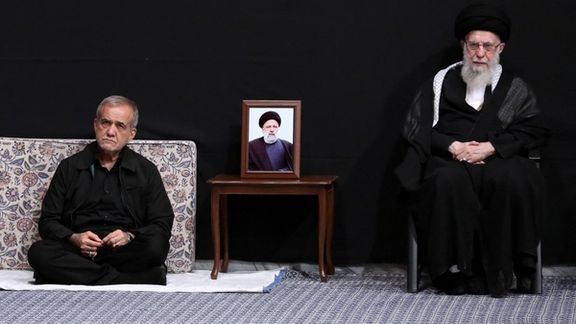
Supporters of Iran's President-Elect Masoud Pezeshkian, with good intentions, have recently caused trouble for him, prompting him to publicly affirm that he remains the same person and that his election has not changed his self-perception.
Some of his supporters have been attempting to elevate his status above his predecessors by highlighting that he is the first and only president in the world who is both a medical doctor and a fully accredited university professor.
Iranian fact checkers at home and around the world maintained that this a myth. Foreign-based fact-checking group FactNameh refuted the claim as a flat lie, adding that both at the present time and in the past many heads of state have or had equal or higher academic credentials than Pezeshkian.
According to FactNameh, "These include former German Chancellor Angela Merkel who had a Ph.D. in Physics, former Afghan President Mohammad Ashraf Ghani Ahmadzai who was a doctor of cultural anthropology, Cameroon's former Prime Minister Joseph Ngute who had a Ph.D. in Law, the Prime Minister of Congo Anatole Collinet Makosso who has a Ph.D. in law, former Albanian President Alfred Moisiuwho was a doctor of military sciences, and Jordanian Prime Minister Bishar Khasawneh who is a doctor of philosophy of law."
FactNameh added that many of those heads of state are perhaps much better educated than Pezeshkian with high recognitions as graduates of law, political scienceand economics.
Meanwhile, Iran's first president, Abolhassan Banisadr, held a doctorate in economics, and former president Mahmoud Ahmadinejad held a Ph.D. in transportation and traffic engineering.
At the same time, an initiative to introduce Pezeshkian as a deeply religious individual backfired as he went to see preacher Hossein Ansarian. Ansarian gave the president-elect his own black handkerchief and rosary. However, Pezeshkian's supporters were displeased that he visited Ansarian, one of the few clerics permitted to enter Khamenei's residence and recount the tragedy of Karbala to move the Supreme Leader to tears.
To add a dramatic flair to the session, Ansarian told Pezeshkian that he wanted the handkerchief to be buried with him when he dies, as he had shed many tears into it for the martyrdom of Imam Hussain, the third Imam of the Shiites.
In another dramatic show, some of Pezeshkian's supporters doctored a video of his arrival at Ansarian's mosque, creating a slow-motion version accompanied by epic music, making it appear as though he was performing an extraordinary act by visiting a mosque during the mourning month of Muharram. Social media users harshly criticized Pezeshkian for this utterly sensational yet otherwise banal video.
Iranian journalist Maryam Shokrani wrote in a tweet that it was ridiculous that some of Pezeshkian's supporters expected to behave like one of those traditional landlords who bossed citizens around. She reminded that in other countries, even the biggest officials are the people's servants, not the other war round.
Meanwhile, as Pezeshkian was caught offhand on live TV while a crowd chanted slogans in support of Green Movement leader Mir Hossein Mousavi, who has been under house arrest since 2011. The president-elect was suddenly speechless and finally he was saved by the state TV cutting off the sound, otherwise, whatever he said could turn out to be controversial or worse.
The new president seems to need some training on how to diplomatically handle such situations, as appearing in large crowds could expose him to unexpected challenges. His supporters defended him by saying he did not comment on the slogans because Mousavi did not support him in the election. However, expecting support from an elderly man who has been under house arrest for so long is unrealistic. This incident has already tarnished Pezeshkian's reputation as someone who promised to uphold the rights of all citizens.
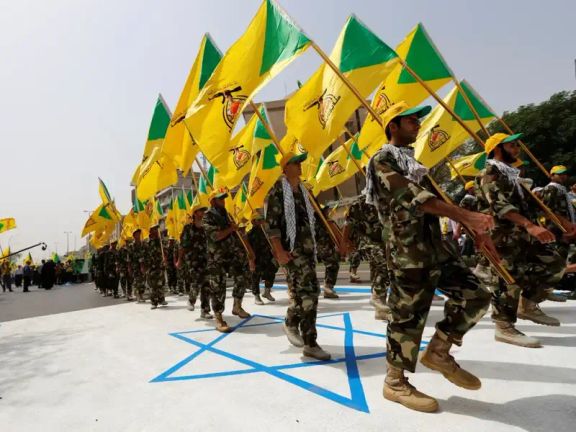
The Iranian-backed Iraqi militant group Kataib Hezbollah issued threats against Saudi Arabia, despite the recent détente in Tehran-Riyadh relations.
After years of severed diplomatic relations, Iran and Saudi Arabia agreed to resume their diplomatic relations by signing a China-brokered renormalization deal in March 2023.
Kataib Hezbollah, an Iraqi Shia group closely aligned with Iran's Islamic Revolutionary Guard Corps (IRGC), warned Saudi Arabia, which it termed the "Kingdom of Evil," of consequences for its perceived role in the Israel-Gaza conflict.
The threats also extended to Bahrain and the UAE, countries that normalized relations with Israel under the Abraham Accords. Kataib Hezbollah called for increased resistance against Israel and stronger support for Gaza, consistent with its history of Iranian proxy warfare.
Despite last year’s reconciliation between Iran and Saudi Arabia, Kataib Hezbollah's stance suggests the possibility of renewed hostilities.
Kataib Hezbollah is part of a broader coalition of Tehran-backed militant groups, called the Islamic Resistance in Iraq, which has been launching rocket and drone attacks against Israel and the US since the beginning of the Gaza war last year.
The US has sanctioned Kataib Hezbollah since 2009 due to its connections with the IRGC and involvement in attacks on US interests.
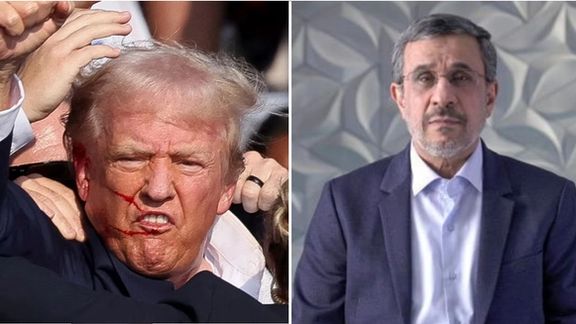
Iran's former president Mahmoud Ahmadinejad condemned terrorism on Sunday in an apparent reaction to the recent assassination attempt on former US president Donald Trump.
Trump was targeted in an assassination attempt at a rally in Pennsylvania on Saturday, resulting in the death of one attendee and critical injuries of two others.
Without naming Trump, Ahmadinejad took to X to denounce terrorism as a violation of human rights.
"Terror and terrorism, whether state-sponsored or non-state, are among the most heinous anti-human actions that words cannot express the depth of their evil," in an apparent reference to the attack."Humanity around the world suffers from such severe pains," he said on X.
The statement is part of his efforts in recent years to rebrand himself as a moderate figure in Iranian politics, although many still remember his hardline policies during his tenure, which included the arrest, torture, and killing of numerous protesters.
Having served as the president of Iran from 2005 to 2013, Ahmadinejad has remained an active and often controversial figure in Iranian politics. He has run for president in every single election since 2017 but has been barred from running three times.
After his latest disqualification, he boycotted the June 28 votes and then travelled to Turkey, sparking mixed reactions. Iranian outlets criticized Ahmadinejad for his photos with women not wearing hijab and questioned the timing of his departure, suggesting a deliberate boycott of the July 5 runoff presidential election.
In an interview with Turkish media, Ahmadinejad emphasized his dedication to peace and global harmony, distancing himself from his past hardline image. It was during his time in office when the morality police were launched to enforce the mandatory hijab on women in Iran.
Ahmadinejad's apparent reaction to the attack on Trump comes one month after he criticized the Supreme Leader's foreign policy, expressing willingness to engage in economic relations with the US and hold talks with Donald Trump.
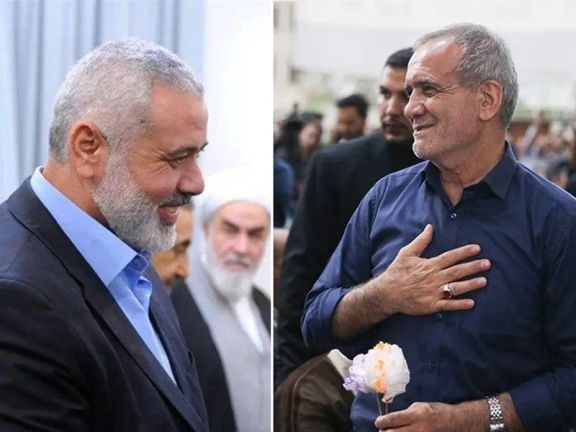
Iran's President-elect Masoud Pezeshkian on Sunday reiterated the Islamic Republic's support for the Palestinian Hamas militant group as well as Yemen's Tehran-backed Houthis.
While Pezeshkian has not identified himself as a reformist nor has he officially aligned with any reformist factions, Western media has recently portrayed him as a "reformist" or "moderate." However, his actions and statements since his election victory align with the policies set by Khamenei, including supporting the anti-Israel "Resistance Front."
In a phone conversation with Hamas chief Ismail Haniyeh on Sunday, Pezeshkian said the Islamic Republic will never leave the Palestinian nation alone in these difficult times."
This was their first phone call following Israel's Saturday strike targeting Hamas military chief Mohammed Deif.
Pezeshkian had earlier on Wednesday reiterated Tehran's support for its proxy groups fighting Israel, a move that once again signals Iran's major policies are dictated by Khamenei, leaving presidents with little room for change.
Similar sentiments were conveyed to Syrian President Bashar al-Assad and Hezbollah Secretary General Hassan Nasrallah, demonstrating Pezeshkian's commitment to the so-called Axis of Resistance.
Praise for Houthis amid ship attacks
In a separate call with Houthi military leader Mahdi al-Mashat on Sunday, Pezeshkian said the "people of Iran and free nations appreciate the actions of the Yemenis under the current difficult circumstances." He also expressed hope for expansion of relations between the two sides.
Iran has been arming, training, and funding the Houthi militia, which have been launching attacks against commercial vessels since the beginning of Israel-Hamas war in Gaza Strip last year.
Over 60 targeted attacks on vessels, along with missile and drone launches, have resulted in the deaths of four sailors and the kidnapping of dozens. These attacks followed a call from Iran’s Supreme Leader Ali Khamenei for Muslim nations to blockade Israeli trade.
In his phone call with al-Mashat, the Iranian president-elect criticized certain Muslim countries for acting “based on their own interests and merely issue statements" in the wake of Israel's war on Gaza.
“Naturally, free nations will judge those rulers who have not taken action to stop the crimes of the Zionist regime against the Palestinian people," he said.
The comments echo similar statements by Khamenei who has criticized other Islamic countries for not severing all relations with Israel and "being soft" on the Jewish state.